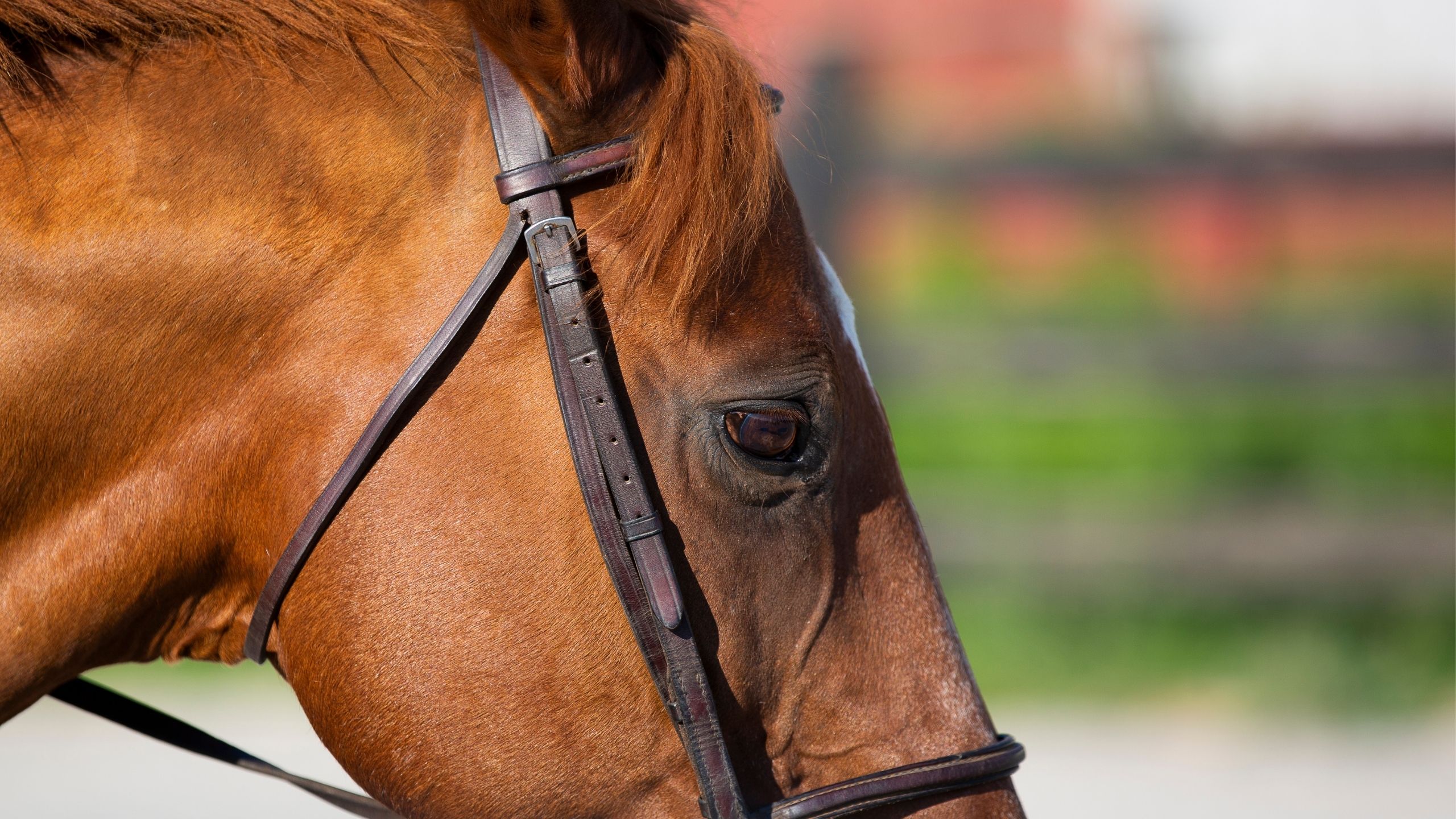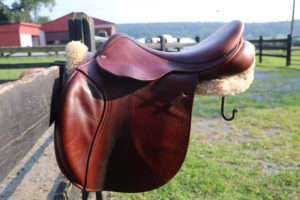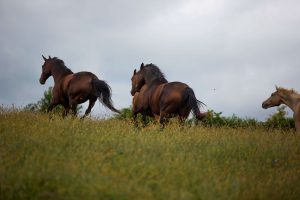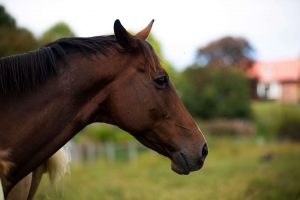It is no fun to ride a horse who feels like they aren’t enjoying having us up there. We ride because we love horses, we want to be around them, spend time with them, and then yes, riding is fun too.
But if our horse isn’t happy, the joy of riding quickly disappears.
There may be many reasons why a horse may be unhappy and then not willing to do what we ask from the saddle, but in the video below, I will share the top three reasons I see most often.
Hint… as you are watching, think of a horse you have worked with who wasn’t too happy… could one of these three have been the cause?














26 Responses
Hi Callie great video as always.
I believe environment is often overlooked.like you mention.once a Horses needs are met according to the 5 freedoms.alot of physical issues and behavioural problems won’t happen.
Then Rider suitability I would also consider.hence its so important to consider a professionals opinion when choosing a Horse to buy.
Environment is so important to consider!
-Julia, HorseClass Support
A mare kick back at you leg in the early part if the breeding season even though she’s not being bread I thought Perhaps she might be tender when being in season.
that should be Kicks back, and bread should bred.
2-26-2021
Hi Callie,
I have an American Saddlebred mare, ahe’s 13 years old. How can I tell if she has balance issues? She’s a former show horse, has had a lot of abuse and is very insecure, spooky, worried, always on extreme high alert. I’ve ordered your book Staying in the Saddle. I appreciate any suggestions you may have and very much enjoy your videos!
Hi Karen, thanks for ordering the book I think you’ll find it to be a super valuable resource for you! I would recommend checking out our video about how movement affects the horse’s behavior by clicking here.
-Julia, HorseClass Community Manager
Hi Callie,
My horse is so often scary of things in her surrounding, other horses, sulkies, cars in movement, flowers, changing vegetation etc. I tried a lot to get her trust, but often she has her own opinion and does’nt take care of me in the saddle.
What can I do to calm her down in difficult situations?
Nicole
Hi Nicole, we actually did a video about factors to consider with spooky horses. I think you’ll find some helpful tips if you watch that video by clicking here.
-Julia, HorseClass Community Manager
Hi Nicole, I was having a lot of problems with my Arab after moving from the Prairies to Vancouver Island. Very different habitat for his open skies brain. We have partly solved it by constantly asking him to do “something” when he starts to lose his attention to something scary. This may be doing a circle, or bending in a different direction, a leg yeield etc etc – it has taken time but there has been lots of improvement. We have also changed from being very reassuring(not working) to expecting some response as a working horse instead. This has been done over several months, three days work, one day off, 3 days on, 1 day off. Each working session has been only for about 30 mins. We started at walk for the first month, always asking for attention, insisting on regular rhythm, on a loose rein with small tap,taps to insist to not slow into a sloppy walk. I saw a horse come into a frame on a loose rein, develop muscle and top-line and sweat – all at walk !!! Give her a job to focus on – YOU !
My husband’s horse started bucking occasionally, despite vet care, saddle fit, and adequate turnout and exercise, and lessons with a trainer. After my husband sustained a significant injury, I had the trainer take him on full time to get him ready for resale. I contacted a trainer who had shown his full sister, and she asked if “Woody” was 5 panel negative. The mare she had was heterozygous for PSSM-1. I had never heard of these metabolic issues, and spent a tearful night on the internet. Then I drove a DNA sample to the U of M. He had the same profile as his sister. (The sire has since been gelded) I talked to one of my vets about euthanasia, and she said, “Give diet change 30 days.” He stopped bucking in less than a week. His new owner, who promised to put him down if his symptoms ever became unmanageable, just sent me a photo of one of her kids riding him bareback. He really was a sweet guy. Polysaccharide storage myopathy prevents sugars from breaking down in the digestive tract, and sugars are stored in muscle tissue causing tightness, pain, sometimes tying up or colic. This was a heartbreaking journey.
Ruling out any sort of physical issue should always be the first step to fixing any behavioral problem!
-Julia, HorseClass Support
Hi Callie,
I have a welsh mare she is coming up to 11. She is very strong willed but most of the time she is great. Now and again we go through these ‘mood swings’ where she won’t go forward and just decides to go backwards! and there is nothing I can do about it! This only happens if we are out on our own! When out with other horses she is fine! Any suggestions?
Hi Carol, does this only happen when you are hacking out?
-Julia, HorseClass Community Manager
Have you tried then just turning her around and making her go backwards in the direction you wish to travel ? Just keep going backwards and she will get really fedup with it – trust me. Sounds like she has your number! The welsh can be very smart, and sounds like she will likely continue until you play her at her own game !! Good Luck. I am sure she is really lovely.
Thank you for this useful information.
Glad you enjoyed this video Marjorie!
-Julia, HorseClass Community Manager
Pain from arthritis or inflammation can cause unwilling behavior as well as anxiety. I know because I put my 3 Hanoverian mares on a joint supplement because of age and to protect their joints. One of my horses had become a bit spookier but never showed arthritic symptoms. This behavior went away after a couple of months. I never attributed her spookiness to pain she was experiencing. I’m riding all of them now and they are happier and more mobile.
Thanks for sharing that Trudy, I’m sure other riders and their horse’s could benefit from trying that! Pain can definitely cause behavioral changes.
-Julia, HorseClass Community Manager
For me a few circumstances converged, I moved my very sweet mare, who I had had very few issues with into a stall for the winter. She had always been out, in a pasture, with a large herd. she had a medical issue in had to treat for a few months, but could be ridden. She was very unhappy, spooky , balky, and I guess mad at me. I have basically started over with ground work, short rides working on bending and listening, and more turnout. Her and personality seems to be coming
Sometimes all it takes is going back to the basics and getting a more solid foundation to advance
-Julia, HorseClass Community Manager
Sounds like you are doing the right thing. She would have felt very fearful without her herd to protect her and lonely too I am sure. My horse spent his whole life living in a herd outside for 16 years then moved into a life of open boxstall plus paddock – is always outside in every weather unless we shut him in! Has settled in with horses in adjacent paddocks but it is a hard adjustment for them being a prey animal.
Hi Callie and Julia,
Excellent video! I have a 11 year old mare that was a rescue from a feed lot. She came to me mentally and physically scarred. She has trust issues still after owning her for about 3 years now. She seems to almost “give up” when on a lead but trying to catch her in the pasture can be near impossible. She is not food motivated so that doesn’t help. Once caught she is pretty well behaved on the ground but is always on high alert. I have not gotten on her back yet but know that she is broken to ride. Any suggestions for help breaking through to her? How do I overcome her past fears? I really want to connect with this horse and she seems so close but just will not give over yet.
Sounds like you are making very good headway and she is now fit enough for you to think of riding her ? How often do you work with her ? Trainers have told me in the past that 3 days consecutively followed by a day rest works well for horse training. The day rest acts to consolidate the information from the 3 days training without overwhelming the processing by the horse. The training sessions should be short, building on successful outcomes, always trying to make it not too big an ask from last time. Little steps are more easily handled than big ones. Sometimes just doing something right is enough to be patted and put away. Take the time – it will shorten the journey. As Callie says, horses are anxious when they do not understand. Anxiety prevents learning. Good Luck my dear, good for you with what you are doing.
Diane, this is an excellent question. Have you done any of the Developing Balance In Hand exercises with her? I know you are a member of that course and that can really help encourage relaxation during a session. Also, within Leg Up Coaching there is a section on Liberty with a library of videos on working with connection. Feel free to send me an email at support@horseclass.com and I can also send you specific links there.
-Julia, HorseClass Community Manager
My Mare had an explosive episode on Thursday. She had been ridden for about 2 hours when the explosion occurred. This has happened once before years ago. The behavior cannot be predicted. I’m thinking she could possibly have ulcers. For two days prior she was unwilling to be caught and haltered. I also noticed a lot of licking and chewing. We have a call into our vet. People are urging me to get rid of her. I have had her for over 4 years and I am torn. I’m going to get my Vets opinion. I just want to do the right thing.
Cindy, the best route would be to get your vet out as soon as possible to have a check of the physical comfort of your horse.
-Julia, HorseClass Community Manager